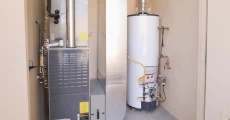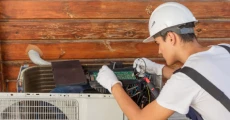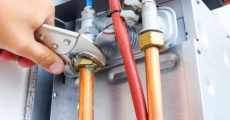How to eliminate bad odors from | Sheaters??

Unusual odors from your heating system can range from mildly unpleasant to potentially dangerous. This comprehensive guide helps you identify different types of heater smells, understand their causes, and provides effective solutions to eliminate them. Learn when you can address odors yourself and when professional help is necessary.
How to eliminate bad odors from heaters?
That first blast of warm air from your heater should bring comfort, not concern. Yet many homeowners experience unusual odors when running their heating systems. Understanding these smells – from musty odors to chemical-like scents – can help you maintain a safe and comfortable home environment. Let’s explore the most common heater odors and learn how to eliminate them effectively.
Your fridge is a kitchen superstar as it keeps all your food fresh and drinks cold.
But does the fridge feel warm when you open it?
Is there water all over the floor?
Fridge issues are the worst!
Common Heater Odors and Their Sources
Musty or Moldy Smells
One of the most common complaints about heating systems is a musty odor, especially when first starting the system after a long break. This smell typically indicates moisture problems within your system. During the off-season, dust and debris can collect in your ductwork and air handler, creating perfect conditions for mold growth when combined with humidity. Regular maintenance, including duct cleaning and proper humidity control, can prevent these unpleasant odors from developing.
Burning Dust Odors
That burning smell when you first turn on your heater after months of disuse is usually nothing to worry about. It’s typically just dust-burning off your heating elements or heat exchanger. This odor should disappear within a few hours of operation. If it persists beyond a day, however, you may need a professional cleaning of your system’s internal components.
Electrical or Metallic Smells
An electrical or metallic smell could indicate overheating components within your system. This might be due to a failing motor, frayed wiring, or other electrical issues. Unlike dust burn-off, these odors require immediate attention. Turn off your system and contact a professional technician, as these smells can indicate potentially dangerous conditions.
Rotten Egg Smell
A rotten egg smell is one of the most serious odors you might encounter. Natural gas companies add this distinctive sulfur smell to help detect gas leaks. If you notice this odor, take immediate action:
- Open windows and doors
- Evacuate everyone from the building
- Call your gas company or emergency services
- Don’t operate electrical switches or appliances
Prevention and Maintenance
Regular System Care
The best way to prevent unpleasant heater odors is through consistent maintenance. Professional cleaning of your heating system before the cold season begins can eliminate many potential odor sources. This includes cleaning or replacing:
- Air filters
- Heat exchangers
- Ductwork
- Blower components
Controlling Moisture
Moisture control plays a crucial role in preventing musty odors. Consider installing a whole-house dehumidifier if you live in a humid climate. Keep your home’s humidity levels between 30-50% to discourage mold growth while maintaining comfort.
Ductwork Maintenance
Your ductwork can harbor numerous odor-causing substances. Professional duct cleaning every 3-5 years can significantly improve your indoor air quality and eliminate persistent odors. Additionally, sealing leaky ducts prevents moisture and debris from entering the system.
Natural Solutions for Minor Odors
Sometimes, minor odors can be addressed with natural solutions. Placing air purifiers near your vents or using activated charcoal filters can help absorb unwanted smells. However, these are temporary solutions and shouldn’t replace proper system maintenance.
When to Seek Professional Help
While some odors are harmless, others require immediate professional attention. Contact an HVAC professional if you experience:
- Persistent burning smells
- Chemical odors
- Electrical burning scents
- Continuous musty odors despite cleaning




The Bottom Line
Don’t let unpleasant heater odors compromise your indoor air quality or safety. Regular maintenance and prompt attention to unusual smells can protect your family’s health and your heating system’s longevity.
CLT Appliance Repair specializes in comprehensive heating system cleaning and maintenance. Our certified technicians use advanced diagnostic equipment to identify odor sources and eliminate them at their roots. With our satisfaction guarantee and industry-leading cleaning techniques, we’ll ensure your heating system delivers fresh, clean air throughout the winter season with our expert heating repair in charlotte nc.
FAQs
Air fresheners only mask odors temporarily and don’t address the underlying causes. Professional cleaning is more effective for long-term results.
For dust burn-off odors, wait 24 hours. For any other unusual smells, especially gas or electrical odors, call immediately.
While important, filter changes alone can’t address all odor sources, especially those originating from ductwork or internal components.
High humidity can create conditions for mold growth in your heating system, leading to musty odors when the system operates.
Varying odors in different rooms might indicate ductwork issues or uneven system maintenance needs in specific areas.
Don't let a malfunctioning Heater disrupt your daily life. Contact CLT Appliance Repair today at 704-606-9043 to schedule your Heater repair service.
We'll have your Heater back to optimal performance in no time!
Dryer Repair Charlotte NC | Washing Machine Repair Charlotte NC | Refrigerator Repair Charlotte NC | Microwave Oven Repair Charlotte NC | Freezer Repair Charlotte NC | Dryer Vent Cleaning Charlotte NC | Dishwasher Repair Charlotte NC | Cooktop Repair Charlotte NC | Stove Repair Charlotte NC | Charlotte Ice Maker Repair | Garbage Disposal Repair Charlotte NC | Plumbing Repair Charlotte NC | Water Heater Repair Charlotte NC
Admiral Appliance Repair | Amana Appliance Repair | Bosch Appliance Repair | Electrolux Appliance Repair | Frigidaire Appliance Repair | General Electric Appliance Repair | Haier Appliance Repair | Hotpoint Appliance Repair | Jenn-Air Appliance Repair | Kenmore Appliance Repair | KitchenAid Appliance Repair | LG Appliance Repair | Magic Chef Appliance Repair | Maytag Appliance Repair | Roper Appliance Repair | Samsung Appliance Repair | Speed Queen Appliance Repair | Whirlpool Appliance Repair | Dacor Appliance Repair | Viking Appliance Repair | Thermador Appliance Repair | Sub-Zero Appliance Repair | Wolf Appliance Repair | Monogram Appliance Repair | Bertazonni Appliance Repair | BlueStar Appliance Repair | Thor Appliance Repair | Miele Appliance Repair | Cafe Appliance Repair | GE Appliance Repair
Freezer Repair Indian Land SC | Freezer Repair Indian Trail NC | Freezer Repair Pineville NC | Freezer Repair Rock Hill SC | Freezer Repair Belmont NC | Freezer Repair Matthews NC | Freezer Repair Lancaster SC | Freezer Repair Cornelius NC | Freezer Repair Fort Mill SC | Freezer Repair Concord NC | Freezer Repair Denver NC | Freezer Repair Monroe NC | Freezer Repair Mooresville NC | Freezer Repair Harrisburg NC | Freezer Repair Lake Wylie SC | Freezer Repair Huntersville NC | Freezer Repair Kannapolis NC | Freezer Repair Mint Hill NC | Freezer Repair Waxhaw NC | Freezer Repair Troutman NC | Freezer Repair Davidson NC | Freezer Repair Gastonia NC | Freezer Repair Charlotte NC

